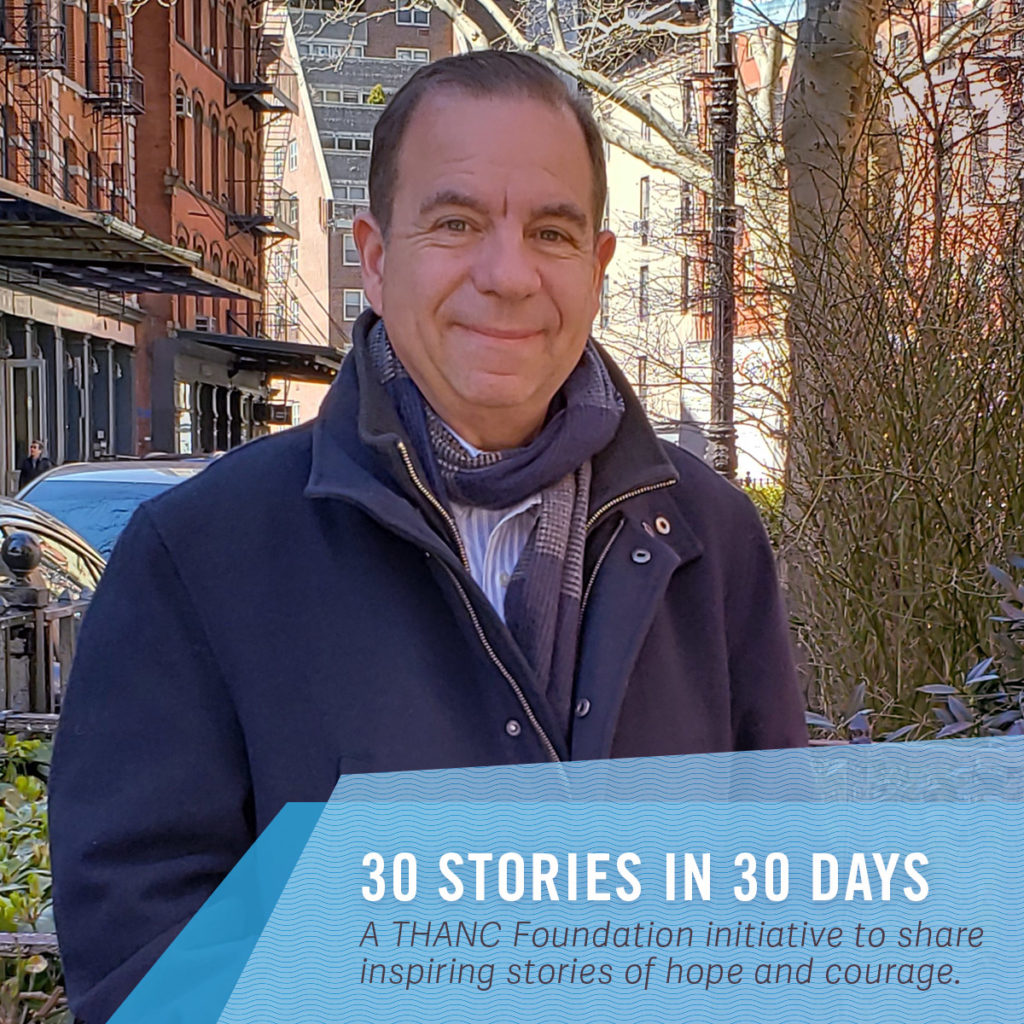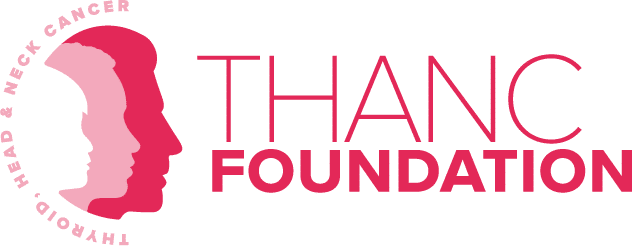
30 Stories in 30 Days
April is Oral Cancer Awareness Month. For the next 4 weeks, we will post stories written by cancer survivors, caregivers and friends for our 30 Stories in 30 Days campaign. We hope their perspectives and insight will help others along their journey.
The Dental Hygienist began the cleaning with her usual flashlight-in-the mouth exam, only this time her head tilted to one side, and with a gloved finger she probed the roof of my mouth and said “Hmm… I don’t like that”. My Dentist did not like it either, and sent me to see an oral surgeon. He tried to remove the abnormality on the roof of my mouth, but wasn’t able to take out the whole thing. When he called me with the biopsy results and told me that I had to “come in”, I knew right away it wasn’t good.
The doctor told me gently that what I had joked was a rogue piece of popcorn in my mouth was actually a Polymorphous Low-Grade Adenocarcinoma (PLGA) about the size of a kidney bean.
Perfect, an acronym! I couldn’t wait to get out into the hallway so I could confer with Dr. Google. The first thing I learned was that even though this was low grade and rare, it was also unpredictable. I left with a referral to see a Head and Neck Specialist.
Having already experienced the biopsy, with stitches dangling from the roof of my mouth and some restrictions about eating, I couldn’t imagine what it would be like to have such a kidney bean-sized opening made in my palate. Not only would there be an incision, but there would also be a reconstruction involving stretching the remaining tissue to cover up the opening. You would think this would be frightening, and it was. But I have to say that the very clear, confident and competent manner of my two surgeons gave me the sense that I was in very good hands.
I went for a 2nd opinion, I mean, that’s what you do for cancer, right? And the 2nd Doctor scared the heck out of me – but using my own business sense I asked some very pointed questions. In the end, his recommendation exactly matched that of the first surgeons.
My mind was not focused on eating though; it was focused on what would happen next.
And so, the unpredictable PLGA kidney bean, turned out to be exactly that: unpredictable. After a 5-hour surgery, it was found that cancer cells were traveling along a nerve via peri-neural invasion, leaving cancer cells roaming around. To fix this, a further, deeper surgery would be needed to remove the entire section very close to my gums and possibly some teeth.
This was quite a shock to absorb and process. After the first surgery, I had been able to speak fairly well and was eating a soft diet, which, happily during the summer months, included ice cream and sherbet. My mind was not focused on eating though; it was focused on what would happen next.
A week later all the pathology was completed, and my doctors were ready to tell me their plan. I invited a trusted friend along to hear what I thought was quite incredible. The area involved, from the center of my mouth to the gumline, would be excised. How large an area is this you ask? I was not brave enough to ask, and I still have never really quantified it. Maybe a square inch? I don’t know. But here’s the crazy part: once the pathology came back clear, a flap would be made using tissue from my arm or leg. This would not be a graft, but a transplant. Somehow this “Flap” would be connected to an artery in my neck using microvascular surgery. Wow!
My friend and I were speechless… but the thing I will never forget was that we both looked at each other and shook our heads in the affirmative. We both trusted the competency and confidence of the surgeons.
And of course, I went for a 2nd opinion, that’s what you do with cancer, right? This time, the doctor I contacted was convinced I should have a prosthetic plate put in to cover the hole. Ugh, that was not an appealing prospect on many levels.
Then I heard an intern ask “Why is the patient walking around the OR?”
One thing I haven’t mentioned is logistics. While all this was happening, life was going on. The first thing I have to say is how nice it feels when friends and family do their best for you. When I would say, “I have a doctor’s appointment, can you help me?” even before I could get the words out, they would say, “no problem”. If you are a patient, you must establish a rapport with your caregiver and their team. I tried to be part of the team, filling out forms, answering questions and just generally being cheerfully cooperative wherever I could to make things go more smoothly. It helps make everyone’s life a little better.
And there it was, 6 weeks later, I was down for a second major surgery. This time when the gurney brought me down the hall, I was asked “Do you want me to wheel you or do you want to walk in to the OR?”I responded, “I’ll walk in thank you!” There were very high-tech gadgets all over the place, and busy people getting things ready. I did a little walk around, checking out the Robotic Surgical Equipment I had read so much about. Then I heard an intern ask “Why is the patient walking around the OR?” “Just looking around,” I replied… true story. I then laid down on the very narrow operating table and confirmed, for the third time that day, my name and what the procedure was going to be. Then it was lights out.
When the lights came back on, the first thing I noticed was the clock on the wall of the ICU. It said seven-thirty, and I said, “Nine hours later, no way!” It had been an eight-hour surgery, I had a big cast on my arm, (what was that about?) and I was in the ICU. I had not expected this. A little out of it, but still myself, I wanted to know what was going on… right away. It seemed like all I would get out of anyone that night was that I needed to rest and stabilize. This would have been fine, except that every hour I was woken up for an ultrasound probe to verify that blood was flowing into the newly transplanted tissue covering the hole in the roof of my mouth. This was surreal, yet real, and I could hear the pulsing swish of the blood flow, which soon became a reassuring sound. I was released to a hospital room the next afternoon, and the surgeons visited me with the good news: no teeth had been removed, and, more importantly, they were able to get wide and clear margins of the bad cancer cells. This relieved a fear that had haunted me for 3 months. They also told me that the flap looked good, and that the ultrasound probes (which I had come to call “Flap Jack” checks) would likely continue, just to make sure everything was OK.
I don’t think I will ever forget… the nurses and orderlies that helped me those four days.
I want to take a moment here to mention the smiling interns that would shyly, politely, and apologetically come into the room at 2am. I remember many of their names, and I don’t think I will ever forget them or the nurses and orderlies that helped me those four days.
They say for each day in the hospital there’s one week of recovery. I think “they” are right… it took a few weeks to get back to work, 4 weeks to forget for a minute or two and even longer, maybe 8 weeks to feel semi normal. The flap felt like a large piece of chicken filet sewn to the roof of my mouth. In my case, I did not have much pain. If anything, there was more pain from the 6 inch incisions on my arm and leg where the tissue for the flap had been. Over time, the flap did shrink upwards and started to get out of the way.
Today, I can eat ok, but I’ve burnt the flap a few times. Did I mention it has no nerves or sensation? When I drink, an extra swallow is needed since I can’t tell if I’ve cleared everything out, otherwise, as I’ve found, I choke. Things with skins, like apples and grapes require an extra swallow or two. And then there’s that minor speech impediment that no one else hears, but that’s made me learn to become somewhat of a ventriloquist. If I need to speak importantly or in public, I sort of “throw” my voice… it works and is not much of a big deal to master.
It’s a process, but if you give yourself a chance to recover, your body will become stronger, maybe even more so than before. Finally, here’s what you really want to know if you have what I have: since I had a good surgical team keeping a close watch over me, my oncologist felt that I could forego radiation, providing that I stay clear. My next MRI is in April, almost a year to the day from the dental appointment that started it all, and my fingers are crossed.


